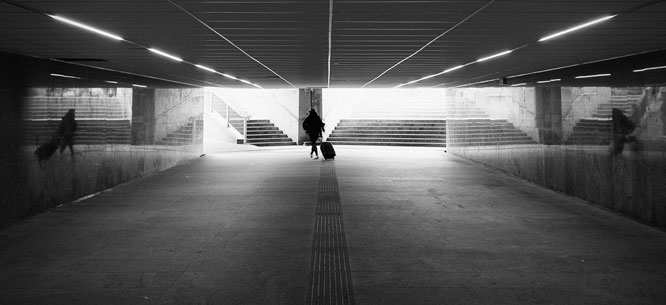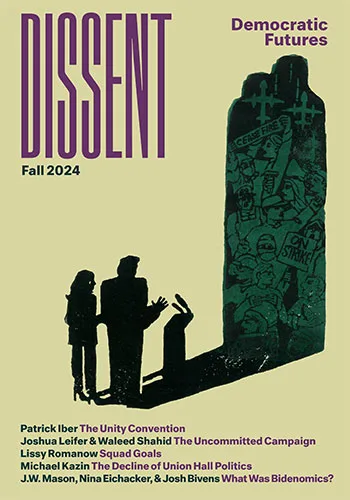In Poland, Followed by Shadows
In Poland, Followed by Shadows
I had always wanted to go to Poland—the country where my father’s family comes from, but also where much of that family was wiped out.

I had always wanted to go to Poland, but I couldn’t imagine how. When I was twenty, I thought maybe I’d meet a girl on a train, and…well, see the delicious plot of the movie Before Sunrise. But that was a long time ago, in the days of what turned out to be the false dawn of “The Thaw.” The 1990s dawn of what Poles called “The Transition” was less romantic, more grimly real. Today’s Polish political culture seems to be dominated by a cruel Center Right—”the employers’ party,” people called it—linked with an aggressive Church doing its best to erase memories of Pope John XXIII. I was lectured by a reporter from one of the center-right dailies, who told me why Lodz, once the garment center of Eastern and Central Europe, had disintegrated: “The workers got lazy. They wanted to go surfing.” I asked where the surf was in Lodz. In Polish he cursed my foolishness and said, “You, an American, should know this. There’s only one reason businesses fall apart: the workers.” I thought, Oy vey!
The years since the fall of the Berlin Wall have seen very fast deindustrialization. (The collapse of Lodz is a dramatic case. I didn’t get to see the Lenin Shipyards—or rather ex-shipyards—in Gdansk, but that is another. The “look” evokes Detroit and many other cities of our “rust belt.”) But there was little or no left response. Would-be radicals seemed paralyzed by the stigma of half a Soviet century. Krytyka Polityczna projects a new sense of possibility. The people we met in Warsaw, their headquarters, and in several other cities were mostly in their twenties; their founder, Slawomir Sierakowski (“Slavo”), is in his early thirties. They are scornful of the commissars’ mix of cruelty and stupidity; they say it has nothing to do with them. They translated my book, Adventures in Marxism (Verso, 1999), with a cover picture of Marx on a motorcycle. Their liveliness and free-floating energy remind me of the New Left’s glory days, in its Port Huron phase, before the war, when life felt like a new dawn.

It was a delightful trip, but I felt shadows followed me. On a gorgeous sunny late afternoon, the Walzers and I sat in Krakow’s glorious market square—we were told, the biggest market square in medieval Europe. We stretched and smiled at each other. Mike said I would have to put this in a book I want to write about the romance of public space; I agreed. Then one of us said it was very Polish here, wasn’t it? Were we the only “others”? Probably not; but we felt it. Poland is where my father’s family comes from, but also where much of that family was wiped out. Even if that weren’t true, I am a Jew, I know something about my collective history, and I know what happened to us here. (Obama spoke of “Polish death camps” near the end of my stay in Poland, and although many people complained in the USA, several Poles told me they were glad to hear this. In Polish national mythology, Poland was purely a victim in the Second World War; but in reality, plenty of Poles were happy to be participants in the Holocaust.) This world used to be Something Else, a world where socialist Jews, instead of being rare birds and exotic plants, as I felt the three of us were, would simply have blended in, and would have enjoyed what was for a while the most vibrant Jewish culture in the world.
This theme of “shadows” isn’t only our problem. When I spoke with the great film director Agnieszka Holland in Warsaw, I compared some of her best work with an observation by Ryszard Kapuscinski (1932-2007), one of the great twentieth-century Polish intellectuals. Kapuscinski says Poland still has not “graduated” from the Second World War. “The return home from the front is the most palpable symbol of war’s end….But I could not go home,” he says, and he argues that this is true of Polish culture as a whole. “War…didn’t want to surrender.” He explains:
“War,” wrote Boleslaw Micinski in those years, “deforms not only the soul of the invader, but also poisons with hatred, and hence deforms, the souls of those who try to oppose the invader”….Yes, to leave war behind meant to internally cleanse oneself, and first and foremost to cleanse oneself of hatred. But how many [Poles] made a sustained effort in that direction?
Those who lived through the war could help if they could “[b]ear witness in the name of those who fell next to them, and often on top of them; bear witness to the camps, to the extermination of the Jews.” This is hard to talk about, even decades later, and yet “speaking about all this does not divide, but rather unites us, allows us to establish threads of understanding and community.”
[W]e who lived through the war know how it begins, where it comes from. We know that it does not begin only with bombs and rockets, but with fanaticism and pride, stupidity and contempt, ignorance and hatred. It feeds on all that, grows on that and from that.
I repeated a version of my “shadow” remark to a young Krytyka woman, and she agreed, and said that shadows were part of their reality, too. Our presence, all of us steeped in different forms of Jewishness—they may have seen the differences and nuances more clearly than we did ourselves—had a magical power for them: we were shadows come back to life. Some of them equated us with Jerzy Kosinski and Roman Polanski, and spoke of how Jews gave Poland much of its distinctive aura. One young man compared Jews in Poland to blacks in America—another very creative group that proved, I said, that you could live, and often thrive, in a shadow. Despite the “Polish death camps” that haunted them, this was a sign of hope for Poland’s future.
Several people told me they were part (half? 1/4? 3/8?) Jewish, and their families survived purely by accident. It seems the Nazis were better murderers than clerks. I know the Polish population was highly intermarried. You can see this in any 1930s photo of a Polish city. Apart from the blondes, this could be have been the population of East 170th Street. (Now that I think of it, there were a fair number of blondes on 170th Street, too, and in my all-Jewish classes.) Anti-Semites in the interwar period became obsessed with supposed Jewish hypersexuality, and our obscene lustfulness, which they said entrapped virtuous Poles. There really was much intermarriage, and many blended people and families.

When I spoke in Warsaw, I shared a platform with Agnieszka Holland, herself half Jewish. (I felt as if I was sitting next to Joan Crawford or Bette Davis.) Sex and sexual feeling between Polish Jews and Catholics is an important motif in many of her films (note it in her most recent film, In Darkness), and she captures the feeling brilliantly. She said Westerners often liked this, but it seemed to embarrass Poles. I told her I bet the young Krytyka audience, which she didn’t seem too familiar with, would appreciate it. Krytyka Polityczna show a desire and a drive that may help Poland graduate at last.
All photos by Jacob Szafransk. Top: Marshall Berman at Krytyka event; bottom: Berman with Agnieska Hollande




